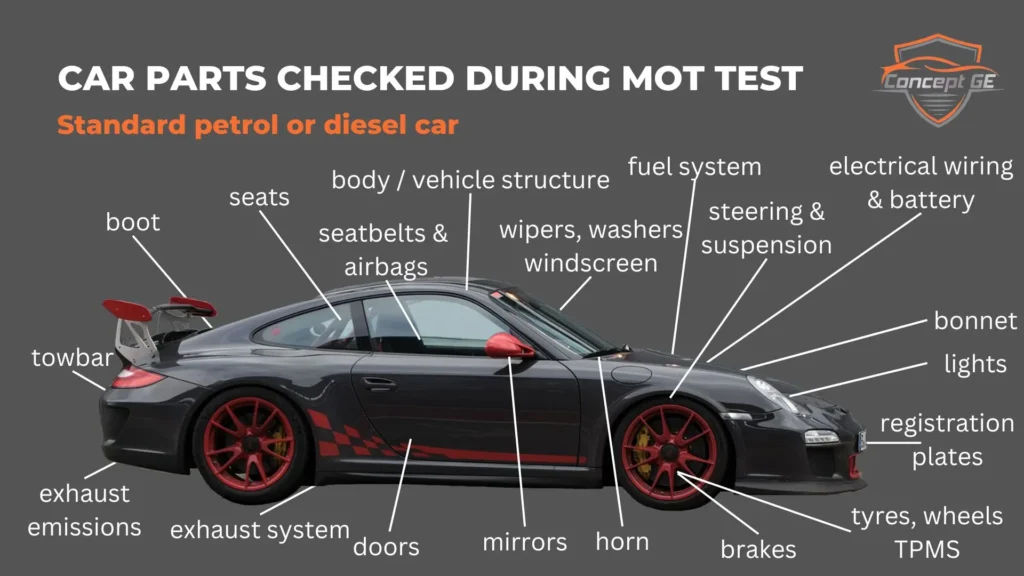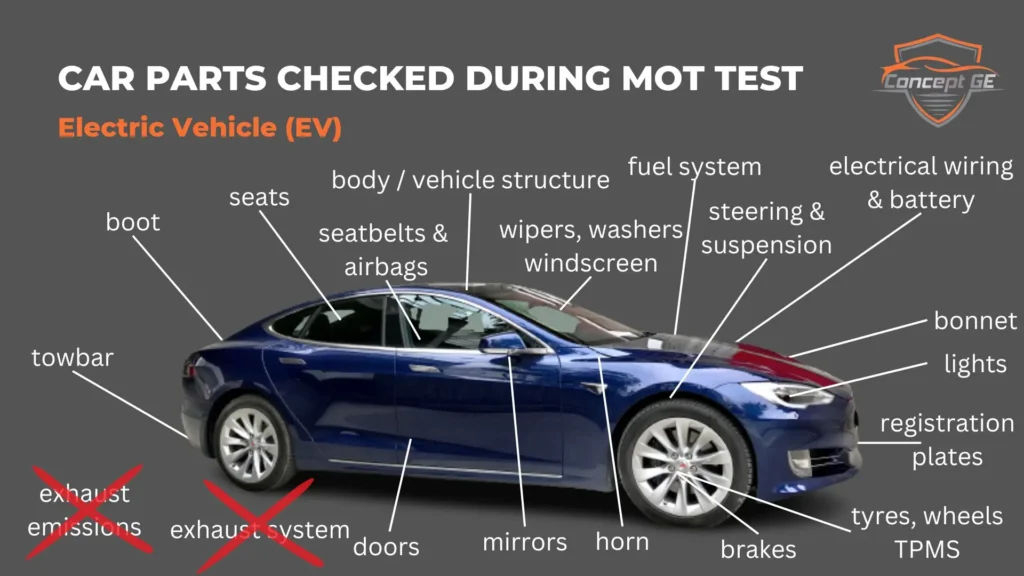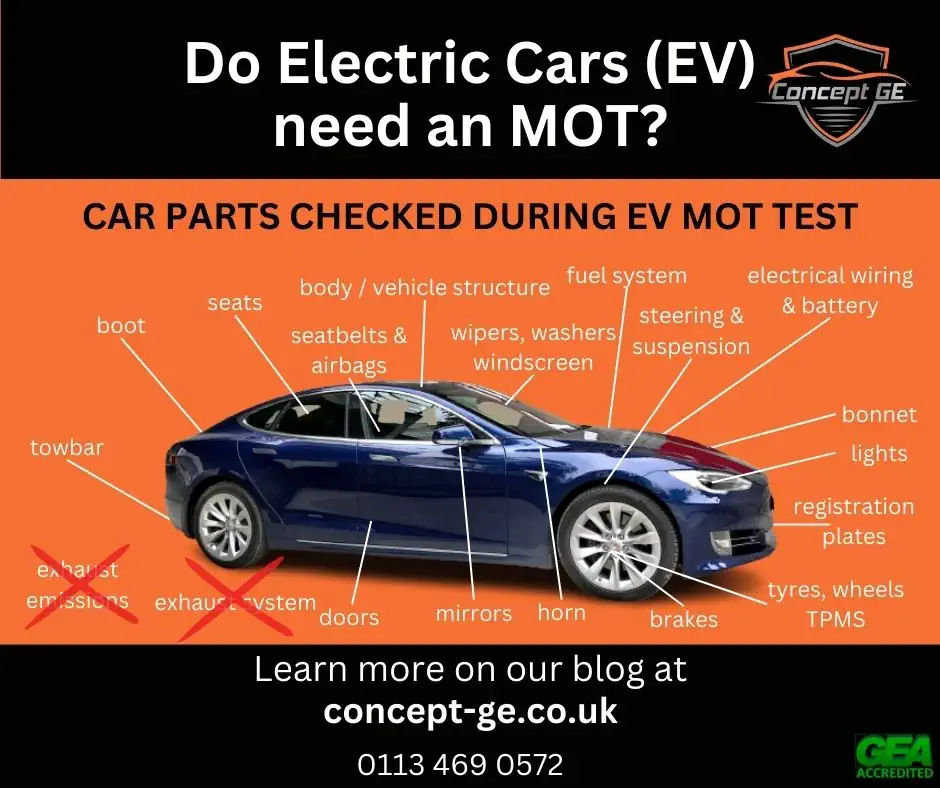Yes, electric cars do need an annual MOT test once they are over 3 years old, but the test for EV cars is slightly faster as there is no need for an exhaust system or emissions tests to be carried out.
With the vast increase in electric vehicles (EV) on UK roads, and the push towards renewable energy several things have changed.
As well as the technology at the fuel filling stations changing, and so, of course, has the technology and mechanics inside this new breed of cars.
Even though the initial purchase price of an electric car tends to be higher than the petrol or diesel counterpart, there are significant savings to be had in the running costs.
For example, when electric cars were first introduced they were free of Vehicle Excise Duty (also often referred to as car tax or road tax) and will remain so until 1st April 2025. As well as this, many places had been offering free EV charging stations, though some have started charging for this, this has certainly helped push the sales of EV cars.
But an electric car does still need an annual MOT test, even though it differs slightly from the standard car MOT test. In this article, we explore how an EV MOT differs from a standard car MOT for a petrol or diesel car.
What are Electric Vehicles (EVs)?
The classification of an electric car or EV vehicle is one that is purely powered by stored electricity, is charged by an external power source and does not produce any exhaust emissions.
Some common examples of electric cars available in the UK are:
- Tesla range
- Kia e-Niro
- Volkswagen ID.3
- Nissan Leaf
- Renault Zoe
What is the purpose of the electric car MOT test?
The Ministry of Transport test or MOT test is an annual check of all vehicles legally required over 3 years of age to check the safety and roadworthiness of the vehicle.
Each car is tested to ensure that it meets minimum safety and environmental standards as defined and maintained by the Driver and Vehicle Standards Agency (DVSA).
More than 25,000 garages in Great Britain are authorised to perform MOT tests and issue MOT test certificates.
Alongside your regular car maintenance, care and servicing, the MOT test certificate and standards around this help to keep the high level of well-maintained vehicles on Britain’s roads, as well as enabling some older vehicles to keep running for many years to come.
For an electric car MOT test the same standards apply, except for the vehicle emissions which are of course not applicable as they do not emit harmful gases from an exhaust system whilst being driven.
What car parts are tested in the MOT?
These are the most important parts checked during the standard petrol or diesel car MOT test:
- Body, vehicle structure and general items
- Tow bars (where fitted)
- Fuel system
- Exhaust emissions
- Exhaust system
- Seatbelts
- Seats
- Doors
- Mirrors
- Load security
- Brakes
- Tyres and wheels including TPMS
- Registration plates
- Lights
- Bonnet
- Wipers and washers
- Windscreen
- Horn
- Steering and suspension
- Vehicle identification number (VIN)
- Electrical System

What is tested during MOT test for a non-electric car
To check the most up-to-date list of car parts checked during an MOT check the DVSA publication
https://www.gov.uk/government/publications/car-parts-checked-at-an-mot/car-parts-checked-at-an-mot
What car parts are tested in the electric car (EV) MOT?
These are the most important parts checked during the standard car MOT test:
● Body, vehicle structure and general items
● Tow bars (where fitted)
● Fuel system
● Seatbelts
● Seats
● Doors
● Mirrors
● Load security
● Brakes
● Tyres and wheels including TPMS
● Registration plates
● Lights
● Bonnet
● Wipers and washers
● Windscreen
● Horn
● Steering and suspension
● Vehicle identification number (VIN)
● Electrical System

What is tested during MOT test for an electric car
How is the MOT Test for an electric vehicle different to non-electric vehicles?
The only difference between the standard car MOT and the electric car MOT is the absence of the exhaust system & emissions tests.
All other MOT tests are valid and need to be carried out to ensure the roadworthiness of your electric car.
What does the MOT test paperwork contain?
The paperwork the car owner will receive following the MOT test will include:
- MOT Inspection Checklist – showing a summary of tests done, the pass or failure of these and what needs to be done to resolve these, including advisories that may not have resulted in a test failure, but are still advised to be resolved
- MOT Test certificate – this is the official document showing that your car has passed the MOT test
For non-EV vehicles, there would be the addition of emissions testing to be done, and the pass or fail certificate for this will often be included in the MOT paperwork given to the customer.
All MOT test results are also recorded and this MOT history can be checked for any vehicle at the DVSA website
https://www.gov.uk/check-mot-history
Which garages can carry out MOT tests on electric vehicles?
All garages registered to perform MOT tests can carry out MOT tests on electric vehicles.
As an MOT tester, you cannot refuse to carry out an MOT test on one of these vehicles just because you’re not familiar with them and it is your responsibility to ensure that you have the correct and up to date MOT tester training to perform the MOT tests on such electric vehicles.
What is the cost of an MOT for electric cars?
Even though there are some minor differences between the electric car MOT and the standard combustion engine vehicle MOT, the costs for both remain the same. The maximum charge for an MOT (excluding any work or parts that may be needed to perform repairs) is £54.85
You can check the latest MOT fees for all classes of vehicles here
https://www.gov.uk/getting-an-mot/mot-test-fees
How long does it take to MOT test an electric car?
An MOT on a car will usually take between 45 minutes and an hour.
Since an electric car has a few items less to test, this can take a little less time to do, however, the costs charged to the customer are currently the same for both standard combustion engine and electric vehicle (EV) MOTs, hence the income to the garage is very slightly better for MOT on electric cars.
Are electric cars faster to MOT?
Yes, it is slightly faster to MOT test an electric car vs. a standard combustion vehicle, as there are a few less tests, namely the emissions and exhaust checks that do not need to be done on an electric car, and so this may save between 15 and 30 minutes on performing the MOT test.
Can any garage perform MOT for electric cars?
Yes, any garage can carry out an MOT test on electric cars without any additional recognised training. However, you must have completed the format MOT tester training to complete an MOT on any car, whether this is a combustion engine, or electric-powered vehicle (EV).
You can see the range of MOT courses, including AEDM training and MOT tester training courses available on our website.
Do Tesla’s need an MOT?
Yes, despite the advances in technology and the fact that Tesla along with all electric vehicles tend to benefit from having less components and less moving parts overall to, the majority of components covered by the MOT test still need to be checked on a Tesla as well as every other UK road going vehicle.
Once the car is over 3 years old, a Tesla, as well as any other electric or non-electric car, will need an annual MOT test.
As with all electric or combustion engine vehicles, from new, they do not need an MOT for the first 3 years, but then an MOT test is required annually to ensure they are safe and roadworthy for use on UK roads.
Note: All information, prices and data above are correct at the time of writing.
Need help with MOT Equipment?
Concept Garage Equipment offers everything a garage needs, from hand tools, through garage equipment to the complete project management of an MOT Bay design and installation. The company has quickly become established as the go-to for MOT Equipment.
Building on fantastic relationships forged with brand-name suppliers, and feedback received from customers, Concept continues to reinforce these relationships and bring an unparalleled level of service to both new and returning satisfied customers across the UK.
We can offer you advice over the phone at 0113 469 0572, help with choosing the MOT Bay equipment for EV as well as full on-site EV MOT Bay design, MOT Bay Project Management, and EV MOT equipment supply, installation and staff training in the correct use of the EV MOT equipment.
Call us today on 0113 469 0572 or use the website contact form today, we are here to help.
Further reading on the MOT test and EV MOT testing
Parts checked in the MOT:
https://www.gov.uk/government/publications/car-parts-checked-at-an-mot/car-parts-checked-at-an-mot
MOT inspection manual:
https://www.gov.uk/guidance/mot-inspection-manual-for-private-passenger-and-light-commercial-vehicles
MOT Inspection checklist page:
https://www.gov.uk/government/publications/mot-inspection-checklist-vt-29
MOT Inspection checklist pdf:
https://assets.publishing.service.gov.uk/government/uploads/system/uploads/attachment_data/file/966766/mot-inspection-checklist-vt29.pdf


